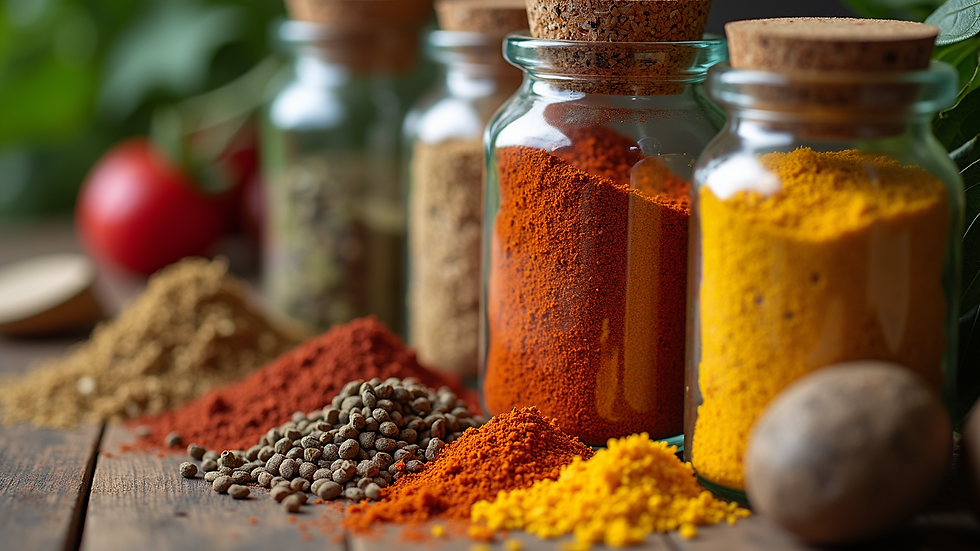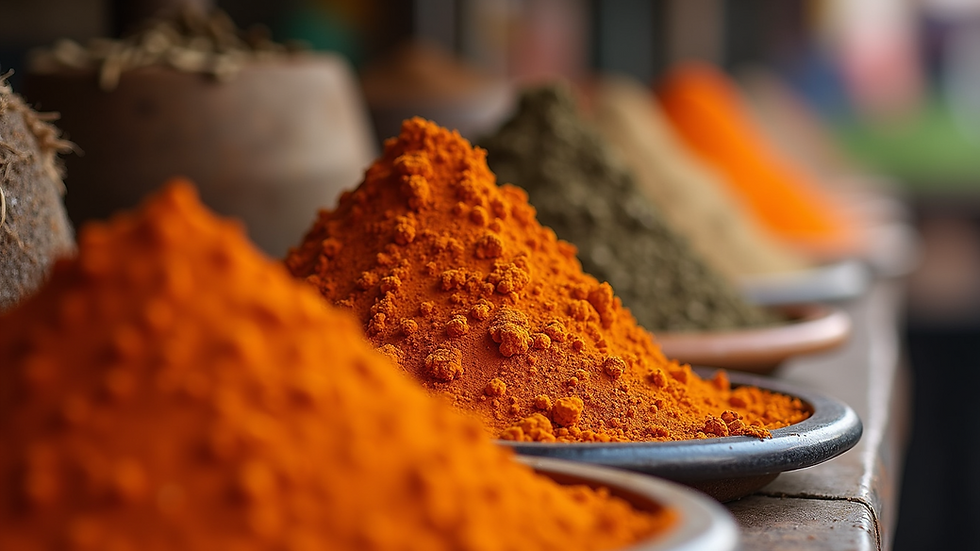Why Organic Spices Are Essential for Healthy Cooking
- Rahul Nair
- Sep 25, 2025
- 5 min read
In a world where health trends come and go, one thing remains constant: the importance of good food. Cooking with organic spices is not just a trend; it is a lifestyle choice that can significantly impact your health. Organic spices are packed with flavor and nutrients, making them a vital part of any healthy kitchen.
In this post, we will explore why organic spices are essential for healthy cooking. We will look at their benefits, how they can enhance your meals, and some practical tips for incorporating them into your daily cooking routine.
The Benefits of Organic Spices
Organic spices offer numerous health benefits that can improve your overall well-being. Here are some key advantages:
Rich in Antioxidants: Many organic spices, such as turmeric and cinnamon, are rich in antioxidants. These compounds help fight free radicals in the body, reducing oxidative stress and lowering the risk of chronic diseases.
Anti-Inflammatory Properties: Spices like ginger and cayenne pepper have natural anti-inflammatory properties. They can help reduce inflammation in the body, which is linked to various health issues, including arthritis and heart disease.
Boosting Metabolism: Certain spices, such as black pepper and chili powder, can help boost your metabolism. This can aid in weight management and improve energy levels.
Enhancing Digestion: Spices like cumin and fennel can promote healthy digestion. They can help alleviate bloating and discomfort, making your meals more enjoyable.
Flavor Without Calories: Organic spices add flavor to your dishes without adding extra calories. This means you can enjoy delicious meals while maintaining a healthy diet.
How Organic Spices Enhance Your Meals
Using organic spices can transform your cooking. Here are some ways they can enhance your meals:
Depth of Flavor: Organic spices can add depth and complexity to your dishes. For example, a pinch of smoked paprika can elevate a simple vegetable stir-fry into a gourmet meal.
Color and Presentation: Spices like saffron and turmeric can add vibrant colors to your dishes. A colorful plate is not only more appealing but also indicates a variety of nutrients.
Cultural Exploration: Cooking with organic spices allows you to explore different cuisines. From Indian curry to Mexican mole, spices can transport your taste buds around the world.
Customizable Recipes: Organic spices give you the freedom to customize recipes to your liking. You can adjust the spice levels to suit your taste, making every meal unique.
Practical Tips for Incorporating Organic Spices
Now that you know the benefits of organic spices, how can you incorporate them into your cooking? Here are some practical tips:
Start Small: If you are new to cooking with spices, start with a few basics. Common organic spices like garlic powder, cumin, and oregano are great starting points.
Experiment with Blends: Try creating your own spice blends. For example, mix equal parts of paprika, garlic powder, and onion powder for a versatile seasoning.
Use Fresh Spices: Whenever possible, opt for fresh organic spices. They have a more potent flavor and aroma compared to dried spices.
Store Properly: Keep your spices in a cool, dark place to maintain their freshness. Glass jars with tight lids are ideal for storage.
Add at the Right Time: Timing is crucial when adding spices. For example, add ground spices early in the cooking process to allow their flavors to develop, while fresh herbs should be added at the end for a burst of freshness.
Popular Organic Spices to Try
Here are some popular organic spices that you should consider adding to your pantry:
Turmeric: Known for its vibrant yellow color, turmeric is a powerful anti-inflammatory spice. It is often used in curries and can be added to smoothies for an extra health boost.
Cinnamon: This sweet spice is not only delicious but also helps regulate blood sugar levels. Sprinkle it on oatmeal or mix it into baked goods for added flavor.
Ginger: Fresh or dried, ginger is great for digestion and adds a warm, spicy kick to dishes. Use it in stir-fries, teas, or baked goods.
Cumin: This earthy spice is a staple in many cuisines. It adds depth to soups, stews, and spice blends.
Chili Powder: If you enjoy heat, chili powder is a must-have. It can spice up everything from tacos to chili.
Cooking with Organic Spices: A Simple Recipe
To illustrate how easy it is to cook with organic spices, here is a simple recipe for a flavorful quinoa salad:
Quinoa Salad with Organic Spices
Ingredients:
1 cup quinoa, rinsed
2 cups water
1 teaspoon cumin
1 teaspoon paprika
1/2 teaspoon salt
1 cup cherry tomatoes, halved
1 cucumber, diced
1/4 cup red onion, finely chopped
1/4 cup fresh parsley, chopped
Juice of 1 lemon
2 tablespoons olive oil
Instructions:
In a medium saucepan, combine quinoa, water, cumin, paprika, and salt. Bring to a boil, then reduce heat to low. Cover and simmer for 15 minutes or until quinoa is fluffy.
In a large bowl, combine cherry tomatoes, cucumber, red onion, and parsley.
Once the quinoa is cooked, let it cool slightly before adding it to the vegetable mixture.
Drizzle with lemon juice and olive oil. Toss to combine.
Serve chilled or at room temperature.
This salad is not only healthy but also bursting with flavor thanks to the organic spices.
The Environmental Impact of Organic Spices
Choosing organic spices is not just good for your health; it is also better for the environment. Organic farming practices promote biodiversity and reduce pollution. Here are some environmental benefits of organic spices:
No Synthetic Pesticides: Organic spices are grown without synthetic pesticides, which can harm the environment and wildlife.
Soil Health: Organic farming practices improve soil health, leading to better crop yields and less erosion.
Water Conservation: Organic farms often use methods that conserve water, making them more sustainable in the long run.
Support for Local Farmers: Buying organic spices often means supporting local farmers who practice sustainable agriculture.
Making the Switch to Organic Spices
If you are ready to make the switch to organic spices, here are some tips to help you get started:
Research Brands: Look for reputable brands that offer organic spices. Check for certifications to ensure they meet organic standards.
Visit Local Markets: Farmers' markets often have local organic spices. This is a great way to support your community while getting fresh products.
Buy in Bulk: Purchasing spices in bulk can save you money and reduce packaging waste. Just make sure to store them properly.
Educate Yourself: Learn about the different spices and their health benefits. This knowledge will help you make informed choices in the kitchen.
Embracing a Flavorful Future
Incorporating organic spices into your cooking is a simple yet effective way to enhance your meals and improve your health. With their numerous benefits, vibrant flavors, and positive environmental impact, organic spices are truly essential for healthy cooking.
So, the next time you step into your kitchen, remember the power of organic spices. They can transform your dishes and elevate your cooking experience. Embrace the flavors, explore new recipes, and enjoy the journey to a healthier lifestyle.




Comments